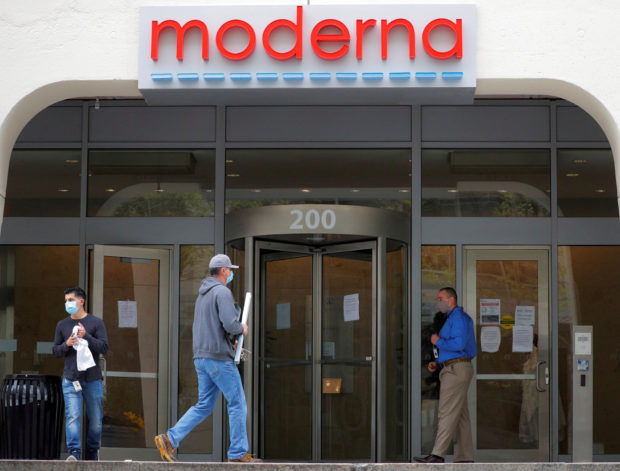China-backed hackers ‘targeted COVID-19 vaccine firm Moderna’
WASHINGTON — Chinese government-linked hackers targeted biotech company Moderna Inc , a U.S.-based coronavirus vaccine research developer, this year in a bid to steal data, according to a U.S. security official tracking Chinese hacking.

FILE PHOTO: A sign marks the headquarters of Moderna Therapeutics, which is developing a vaccine against the coronavirus disease (COVID-19), in Cambridge, Massachusetts, U.S., May 18, 2020. REUTERS/Brian Snyder/File Photo
China on Friday rejected the accusation that hackers linked to it had targeted Moderna.
Last week, the U.S. Justice Department made public an indictment of two Chinese nationals accused of spying on the United States, including three unnamed U.S.-based targets involved in medical research to fight the novel coronavirus.
The indictment said the Chinese hackers “conducted reconnaissance” against the computer network of a Massachusetts biotech firm known to be working on a coronavirus vaccine in January.
Moderna, which is based in Massachusetts and announced its COVID-19 vaccine candidate in January, confirmed to Reuters that the company had been in contact with the FBI and was made aware of the suspected “information reconnaissance activities” by the hacking group mentioned in last week’s indictment.
Reconnaissance activities can include a range of actions, including probing public websites for vulnerabilities to scouting out important accounts after entering a network, cybersecurity experts say.
Article continues after this advertisement“Moderna remains highly vigilant to potential cybersecurity threats, maintaining an internal team, external support services and good working relationships with outside authorities to continuously assess threats and protect our valuable information,” said company spokesman Ray Jordan, declining to provide further detail.
Article continues after this advertisementThe U.S. security official, who spoke on condition of anonymity, did not provide further details. The FBI and the U.S. Department of Health and Human Services declined to disclose the identities of companies targeted by Chinese hackers.
Moderna’s vaccine candidate is one of the earliest and biggest bets by the Trump administration to fight the pandemic.
The federal government is supporting development of the company’s vaccine with nearly half a billion dollars and helping Moderna launch a clinical trial of up to 30,000 people beginning this month.
China is also racing to develop a vaccine, bringing together its state, military and private sectors to combat a disease that has killed more than 660,000 people worldwide.
‘Baseless’
The July 7 indictment alleges that the two Chinese hackers, identified as Li Xiaoyu and Dong Jiazhi, conducted a decade-long hacking spree that most recently included the targeting of COVID-19 medical research groups.
Prosecutors said Li and Dong acted as contractors for China’s Ministry of State Security, a state intelligence agency. Messages left with several accounts registered under Li’s digital alias, oro0lxy, were not returned. Contact details for Dong were not available.
China has consistently denied any role in hacking and its foreign ministry spokesman in Beijing, Wang Wenbin, rejected as “baseless” the accusation that hackers linked to the government had targeted Moderna.
China leads the world in the development of a coronavirus vaccine and it is more worried that other countries using hackers to steal its technology, he said.
“We absolutely do not nor need to engage in theft to achieve this leading position,” Wang said.
The two other unidentified medical research companies mentioned in the Justice Department indictment are described as biotech companies based in California and Maryland. Prosecutors said the hackers “searched for vulnerabilities” and “conducted reconnaissance” against them.
The court filing describes the California firm as working on antiviral drug research and suggested the Maryland company had publicly announced efforts to develop a vaccine in January. Two companies that could match those descriptions: Gilead Sciences Inc and Novavax Inc .
Gilead spokesperson Chris Ridley said the firm does not comment on cybersecurity matters. Novavax would not comment on specific cyber security activities but said: “Our cyber security team has been alerted to the alleged foreign threats identified in the news.”
A security consultant familiar with multiple hacking investigations involving premier biotech firms over the last year said Chinese groups believed to be broadly associated with China’s Ministry of State security are one of the primary forces targeting COVID-19 research, globally. This matches the description of the indicted hackers, as ministry contractors.
For more news about the novel coronavirus click here.
What you need to know about Coronavirus.
For more information on COVID-19, call the DOH Hotline: (02) 86517800 local 1149/1150.
The Inquirer Foundation supports our healthcare frontliners and is still accepting cash donations to be deposited at Banco de Oro (BDO) current account #007960018860 or donate through PayMaya using this link.